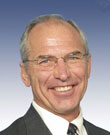
|
 |
Townhall Finance...
This Land is... the
Government’s
by Bob Beauprez
Most people understand that the federal government controls a lot of
land, but few know just how vast the holdings really are. The map
above is courtesy of Investor’s Business Daily. It indicates the
vast amounts of land, particularly in the natural resources rich
western states, held by the federal government.
According to the USDA, Economic Research Service, of the 2,264,000,000
acres that comprise the United States of America, the federal
government owns 635,000,000 of them, or more than 28%. In
addition, state and local governments own 195,000,000 acres and another
56,000,000 acres is the sovereign territory of the various Indian
Tribes.
Thus, nearly 4 of every 10 acres of land in the U.S. – 39.13% - is
owned by a government entity rather than private citizens; easily the
largest asset controlled by the collectivist state. And, even the land
that is privately held has volumes of regulations controlling what
citizens can do on and with it.
Nothing represents the American Dream more than ownership of a piece of
land. While significant areas of the country are legitimate
public treasures, it seems yet another great paradox that in a nation
of supposedly free people committed to private property rights and
individual liberty, vast amount of this country is deeded to the
government’s Central Planners instead of to individual citizens.
There may be a small bit of encouraging news, however. As IBD
explained in a companion article to the above map, there is a bit of a
“sagebrush rebellion” going on in various western states that are
pressing the federal government to hand over control of tens of
millions of acres. One clear outcome of this effort might be
expanded energy production allowed by the states instead of the
obstructionist policies imposed particularly by the Obama Department of
Interior that led to an 11% decrease in oil production from federal
lands in 2011. State governments are at least one giant step
closer to the people than Washington, DC. And who knows,
maybe one day as states struggle to balance budgets, they just might
find it desirous to have tax revenue generating private land within
their borders instead of revenue draining public lands.
Read this and other articles at Townhall Finance
|
|
|
|

